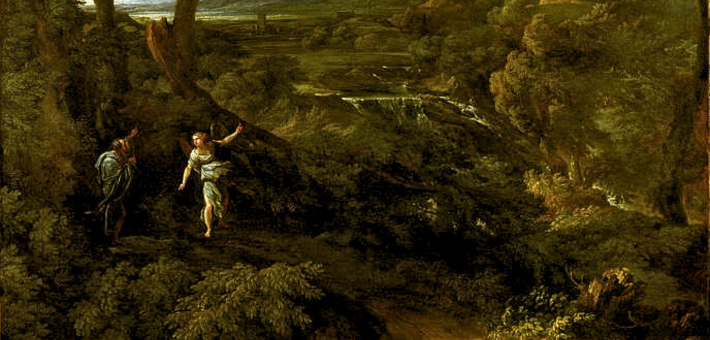Commentary on 1 Kings 19:9-18
The prophet Elijah’s life is in danger, and he is in retreat. He is despondent and has a death wish. Eventually, he finds that despite his fears that only he is left among God’s prophets and is experiencing feelings of abandonment, God is present with him and provides for his needs. This doesn’t mean that Elijah’s prophetic ministry becomes any easier even after the threat has abated.
A prophet like Moses
There had been a three-year drought in Israel because Ahab, king of Israel, had forsaken God’s commandments and followed the Baals, the gods of his wife, Jezebel. Elijah had engaged in a contest with the prophets of Baal and Asherah at Mount Carmel (1 Kings 18) to demonstrate to the people that Yahweh was God. Elijah prevails over the prophets of Baal and Asherah and has them killed. God restores the rains in the land following Elijah’s defeat of the prophets. Ahab reported to Jezebel all that Elijah had done and she swore to take Elijah’s life. He feared Jezebel would follow through on her threat and he fled to Horeb, the mount of God.
Scholars note the allusions to Moses in the characterization of Elijah in this story. He travels forty days and forty nights to Mount Horeb, also called Mount Sinai in other biblical traditions, especially in the book of Exodus. Mount Horeb is also the site where God is first revealed to Moses (Exodus 3:1; see also 24:18). Mount Horeb is used exclusively in Deuteronomy (an exception is Deuteronomy 33:2). The author’s use of Mount Horeb reflects the Deuteronomistic perspective, influenced by the theology of the book of Deuteronomy, that claims that Israel’s failures are a result of disobedience to God’s commandments and her successes are due to covenant fidelity.
What are you doing here?
Once he reached Mount Horeb, Elijah came to a cave where he spent the night. Continuing with the Moses parallels, this was not just any cave but the cave where Moses experienced God’s theophany. The author lends legitimacy to Elijah’s office of prophet by establishing him as a prophet like Moses, whom God promised at Mount Horeb to raise from among the people (Deuteronomy 18:15). At the time, the people feared God’s theophany at Sinai lest they die and asked Moses to speak for them (Exodus 20:18). Elijah has an experience like Moses’ encounter with God in the cleft in the rock at Sinai (Exodus 33:13–23).
The narrator states that the word of the Lord came to Elijah inquiring why he was there. Previously, God sent a messenger (Hebrew malak), also translated “angel” in many English versions, to minister to Elijah while he slept. Given that Mount Horeb was known as the mountain of God, one might have expected an encounter with God there. This time God speaks directly to Elijah in a stereotypical prophetic address. God spoke to God’s prophets through various means including dreams, visions, and casting lots. The text suggests that God came to Elijah in a dream. Elijah has a three-fold response. First, he responds that he has been very zealous for the Lord. This response comes across as defensive for having fled to Horeb. The term “zealous” means to show great energy or enthusiasm for a cause, such as a crusader. Elijah has been campaigning vigorously for God. The cause of his crusade, according to Elijah, is that the Israelites have forsaken the covenant, torn down God’s altars, and killed God’s prophets. Elijah does not mention that he ordered the murder of over 450 prophets of Baal and Asherah as part of his campaign. Still, the people turned back to God after the events at Mount Carmel, so perhaps he is mischaracterizing the people’s fidelity; perhaps Elijah’s recollection of events is hazy.
His second response is that he alone is left of God’s prophets. Elijah’s report that no other prophets survived Jezebel’s slaughter of God’s prophets conflicts with the report he received from Obadiah, a palace steward and follower of God, that he had hidden a hundred prophets and provided them with food and drink (1 Kings 18:4, 12-13). Perhaps in Elijah’s despair he could not recall this detail either. His third and final response is that his life is in danger. In any event, the fact that he is afraid and running for his life is closest to answering God’s question, but it doesn’t explain why he’s at Mount Horeb except for the parallel with Moses.
Just as before with Moses, God commanded Elijah to come out of the cave and stand on the mountain before God where God would pass by. However, Elijah refused and sheltered in the safety of the cave while God’s theophanic presence manifested. First there is a wind so strong that it causes pieces of the mountain to break away, but the narrator reports that God was not in the wind. This theophanic phenomenon was followed by an earthquake and fire. But God was not in these phenomena either. A sound of sheer silence or a small voice followed, the sound of which drew Elijah from the cave. God asks Elijah again what he is doing there and Elijah repeats what he said in verse 10. Despite Elijah’s continued complaints and fear of Jezebel, God re-commissions him to return to the wilderness with assignments to anoint new kings over Aram and Israel and appoint Elisha his successor.
Theological reflection
Elijah ran from his troubles rather than trusting that God would shelter him from harm. In the end, Elijah had to return to the place he fled and do the work that God called him to do. God’s question to Elijah, “What are you doing here?” should prompt us to reflect on whether we are where God would have us be. Are we in a job, relationship, or place where we are emotionally or spiritually far from where God wants us or are we flourishing in spaces that nurture and embrace us?


August 13, 2023